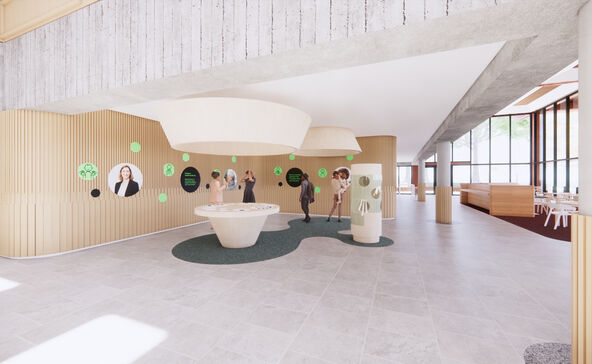- Vision
- Hearing
The NextSense centre for innovation soon to open its doors on the Macquarie University campus will drive innovation to improve the lives of people with hearing and vision loss and boost partnerships to drive Australia’s global impact.
The centre, which has received a $12.5million Australian Government grant, will work with clients of all ages – from young babies to older Australians. It will house a school and preschool, and custom therapy spaces to deliver services such as speech pathology, audiology and hearing and vision early intervention services for children. It will also deliver cochlear implant pre- and post-surgery services to children and adults and its academic arm will support further education for teachers and therapists working with people who have hearing and vision loss. Its spaces will be available to other organisations in the hearing and vision sectors looking for collaboration opportunities and to educate the next generation of professionals.
Acting Prime Minister The Hon Richard Marles MP toured the site on Wednesday with Member for Bennelong Jerome Laxale MP.
‘A pleasure to visit NextSense alongside Jerome today – the work they provide is invaluable and the finished works will provide a new level of support to the local community,' Acting Prime Minister Marles said.
NextSense Chief Executive Chris Rehn said the centre was an investment in the future and would enable the organisation to enhance its services and build new partnerships with government, Macquarie University and other research leaders, industry and the service sector. This would improve outcomes for Australians who are deaf, hard of hearing, blind or have low vision and drive new knowledge that would influence approaches internationally.
‘Around 3.6 million Australians have hearing loss and some 500,000 have vision loss currently, and these numbers are projected to rise significantly in future. The growing number of people benefiting from our services means the new centre for innovation will be much more than just a building. It will be an opportunity to nurture, trial and share new ideas and connect leading thinkers to build new models of care and service delivery that are always evolving as knowledge cycles in and out of our centre,’ Mr Rehn said.
Every detail of the inclusive building design has considered a broad range of needs and abilities and is designed to encourage collaboration. Features include:
- Installations that provide perspectives and information on hearing and vision loss, including a cochlear touchtable that allows visitors to learn about how a cochlear implant converts sound, and inquiry columns that provide insight into vision loss
- An environmentally sustainable design, with 368 solar panels, six electric vehicle charging stations and water tanks, and shading, ventilation and building materials that minimise energy consumption
- Custom-designed classrooms that reduce glare and allow more control over lighting for students with vision loss
- Hearing augmentation to deliver high-quality sound directly to hearing aids
- A custom-designed student bell and emergency evacuation system with visual and auditory alerts including flashing lights and bells
- A sensory garden featuring native bush foods, with tactile characters and outlines of plant illustrations, as well as braille descriptions
- Play areas with accessible equipment including an accessible carousel and Liberty swing for wheelchair users
‘Situated in one of Australia’s leading innovation districts—Macquarie Park—our new centre will be at the heart of a broader ecosystem that will help to build a more inclusive Australia,’ Mr Rehn said.
